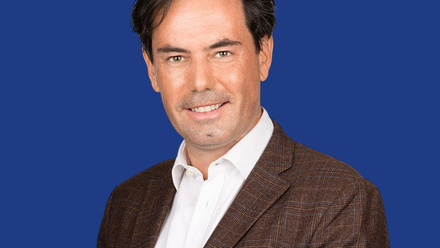Pioneering AI in healthcare: Brainomix member spotlight

In this blog, Dr Michalis Papadakis, CEO of BIA member Brainomix, answers questions on the company's origins and future trajectory following its series C round.
Can you briefly overview Brainomix’s journey from its founding to where it is today?
Brainomix was founded in 2012 as a spin-out from the University of Oxford, driven by a mission to address critical unmet needs in stroke care. The company emerged from the recognition that, despite the availability of life-saving treatments like thrombolysis and thrombectomy, many eligible stroke patients were missing out due to challenges in imaging interpretation. At primary stroke units, where most patients are first admitted, frontline physicians often lack the specialized expertise to analyze brain CT scans confidently. We set out to solve this by developing AI-powered imaging technologies to support accurate diagnosis and treatment decisions.
Over the years, we have progressed through multiple funding rounds. Today, we are a market leader in stroke AI in Europe, with our Brainomix 360 platform deployed in over 300 hospitals across 20 countries, and we are now making strides in the US healthcare system while expanding our AI solutions into lung fibrosis and other conditions.
What have been the biggest milestones in your global expansion?
One of our most impactful milestones came in September 2020, when Brainomix received a prestigious AI in Health and Care Award from NHSx, alongside a grant to evaluate its technology within the NHS. This led to the deployment of the Brainomix 360 Stroke platform across UK stroke networks, resulting in what became the largest real-world evaluation of stroke AI imaging. The study demonstrated a direct increase in treatment rates, particularly for thrombectomy, enabling more patients to access life-saving interventions.
Another key milestone was our partnership with Boehringer Ingelheim. This strategic collaboration focuses on evaluating the real-world impact of our e-Lung technology to enhance identification and treatment access for patients with progressive lung fibrosis. Additionally, our expansion into the US has recently been bolstered by securing £14 million aimed at supporting our growth in the American market, where we have already achieved ten FDA clearances by early 2025.
What challenges did you face in scaling from a spinout to a commercial-stage company, and how did you overcome them?
Scaling from a university spinout to a commercial entity presented challenges like securing sufficient capital, attracting top talent, and driving clinical and commercial adoption of our AI technologies. In the early years, funding was a hurdle, but our location within the Oxford ecosystem provided access to initial investments, such as the £1.35 million raised in September 2014 from the University of Oxford Innovation Fund and grants from Innovate UK in September 2013. Recruitment was aided by Oxford’s reputation, allowing us to build a team that grew from 10-24 employees in February 2017 to 50-99 by May 2023.
Clinical adoption required robust evidence of efficacy. We addressed this by forming key academic partnerships, resulting in over 60 studies validating our technology, such as the Brainomix 360 performance validation announced on 23 January 2025. Our Translational Medicine team played a crucial role in these efforts, bridging research and real-world application.
How has being a member of BIA helped you overcome challenges during that time?
Membership in the BioIndustry Association (BIA) has provided us with a vital network of peers facing similar scaling challenges. Through BIA, we’ve exchanged best practices and gained insights from other biotech innovators, which has been instrumental in navigating the complexities of growth and adoption.
Can you discuss the key investors in this round and why they chose to back Brainomix?
Our latest funding round, announced on 20 March 2025, raised £14 million and was supported by a mix of existing and new investors. Key backers included Parkwalk Advisors, the UK’s largest growth EIS fund manager, which has supported us since at least 2014, and the Boehringer Ingelheim Venture Fund (BIVF), a long-term partner since our £7 million raise in April 2018. These investors were drawn to Brainomix due to the proven impact of our AI technologies, such as the Brainomix 360 Stroke platform and e-Lung, which address critical healthcare needs in stroke and lung fibrosis. Their confidence is underpinned by our track record, including FDA clearances and deployments in over 300 hospitals globally, signaling strong potential for further growth and patient benefit.
Institutional investors are critical to the UK life sciences ecosystem, providing the capital needed to translate research into real-world solutions. Brainomix has directly benefited from such support, with entities like Parkwalk Advisors and the University of Oxford Innovation Fund backing us from our early £1.35 million raise in 2014 to the £14 million round in March 2025. However, a key challenge remains: Early-stage companies often struggle to secure funding when returns are uncertain and long-term. Greater involvement from institutional investors at these nascent stages could accelerate innovation and help more UK biotech firms reach commercial maturity.
How is Brainomix’s technology improving patient outcomes?
Our Brainomix 360 Stroke platform leverages AI to automate validated imaging biomarkers, enhancing stroke diagnosis and treatment decisions across hospital networks. Real-time features like notifications for large vessel occlusion (LVO) and intracranial hemorrhage (ICH), enable faster interventions.
Beyond stroke, our e-Lung technology, shown in a collaboration with AstraZeneca on 27 March 2024, identifies lung fibrosis patients at risk of decline more effectively than traditional methods, potentially speeding up access to treatments. These advancements demonstrate our commitment to enhancing patient outcomes across multiple disease areas.
You have been at the forefront of BIA’s techbio community. Tell us about your experience.
As proud members of BIA’s Data, AI and Genomics Advisory Committee (DAGAC), we’ve had the opportunity to contribute to shaping policy in the techbio space. This platform allows us to share our insights from developing AI-driven healthcare solutions and learn from other innovators. It’s been a valuable experience for us to have a forum where our insights can be shared and discussed.
What’s next for Brainomix following this investment?
The recent investment we have secured will accelerate our US expansion, building on our ten FDA clearances achieved by early 2025. We plan to deploy our Brainomix 360 Stroke platform more widely across American hospitals while advancing our portfolio, including e-Lung and other AI-driven tools for conditions like cancer. With over 75 staff as of early 2025, we’ll expand our Oxford headquarters and global commercial team. Our stroke AI business, already in 300+ hospitals across 20 countries, aims to penetrate markets in the Middle East, Asia, and Latin America. Additionally, our Life Science partnerships, such as those with Medtronic and Boehringer Ingelheim, will grow, embedding our technologies in clinical trials to support new treatment development.
What advice would you give biotech startups on scaling up while staying UK-centric? Are there key strategies or resources that have been particularly valuable in your experience?
Focus on grounding your work in rigorous science, assembling a world-class team, and forging strategic partnerships to amplify reach and credibility. For Brainomix, Innovate UK funding was pivotal for early validation. Staying UK-centric means leveraging the country’s academic hubs, like Oxford, for talent and innovation, while using resources like BIA to navigate scaling challenges. Partnerships with global players can extend your impact without losing that UK foundation.





